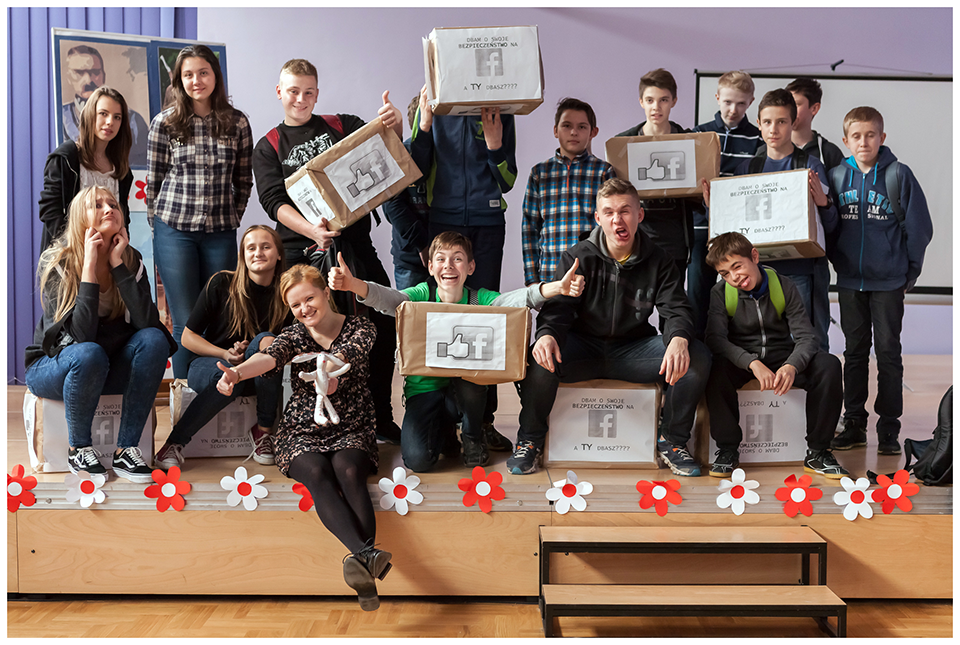Institution: Fundacja 5 Medium Author: Agnieszka Jarmuł
Title: Bezpieczna e-szkoła (Safe e-school)
Topics: network security, media literacy and digital competencies, cultural projects, civic engagement
Characteristics of participants:
Direct Beneficiaries:
A) junior high and high school students using the media every day / devoting a lot of time to studying and extracurricular activities / junior high school students needing much more support than high school
B) adults – teachers involved in the training / interested / active / seekers
C) adults – teachers, carers of groups involved in the project / very active / usually with partnerships with students
D) students – volunteers aged 19-26, carers of particular groups. Students in such elds as: cyberculture, pedagogy, political science, media education.
Individual bene ciaries:
A) children and seniors, recipients of projects prepared by young people
B) parents of young people taking part in the project
C) teachers, educators and educators
Realization: 2012- 2016
Website here
Documentation (Polish):
BEZPIECZNA E-SZKOŁA
Bezpieczna-eszkola-IV-net
PUBLIKACJA “BEZPIECZNA E-SZKOŁA”
Photos:
BEZPIECZNA E-SZKOŁA, EDYCJA III
BEZPIECZNA E-SZKOŁA, EDYCJA IV
BEZPIECZNA E-SZKOŁA V
BEZPIECZNA E-SZKOŁA VI
GALA BEZPIECZNA E-SZKOŁA, EDYCJA III
GALA BEZPIECZNA E-SZKOŁA V
- Summary of the project
The main task of the the project is to stimulate young people to take cultural initiatives for their local community by increasing their competence of using medium of internet and information in the safe, critical and creative ways. Is also a program to support parents and teachers in the di cult process of educating children and youth in cyber- world. Its also supporting using new media in the educational process.
- Project innovation
- Multi annual action, which encompasses all activities of the age group
- The main e ects of the workshops are: realization local, socio – cultural events. Based on the workshops, participants make their own cultural-local
project using ICT and their media literacy competencies. - Students work out of their schools to lead projects with their neighbors and districts (i.e. children, seniors, residents)
- The most important ICT competencies of participants
- know-how to use media and internet in the safe way
- know-how to protect the privacy
- how to create virtual image
- what is the personal anonymity in the InternetThose are the most important competencies that all the participants use in their every day life. However there teach others during the project i.e to children, their parents or seniors.All the participants also have their own ICT competencies that are very useful in the project. It is important that they rely on the skills they have previously acquired that can be used in the project. Usually the skills are:
- how to use graphic programs and apps
- how to use photo programs and apps
- how to use self phones in di erent ways
- how to lm and take photos
- How does the project developed media literacy of participants?
The project program is designed to empower to develop students skills in many areas including:
- Searching for information
- Choosing the ones that will be needed for the project
- Develop extensive network legal expertise (eg CC photos, lm, music, free licenses).
- They learn network security – this is the main theme of the project.
- They also learn digital literacy as they use software, process, record, how to use graphical programs.
- They often communicate using social media (fb – eg groups). They contact a coordinator who is not with them every day.
- They learn the language of the media, how to promote your project, how to
communicate.
-
Projects steps
Each year the project is evaluated and changed. We run workshops for volunteers – students who are familiar with the content of the project. As a part of the project, students are trained in the methodological training about: group work, group management, work with children and young people, working methods. In addition, media literacy workshops are being conducted.
After a series of workshops students are taken care of one of the school groups (elementary, middle school and upper secondary school) submitted to the project. Each of the reported groups takes part in three thematic workshops run by students. Teachers are invited to attend workshops.
Steps:
1. The rst topic of the media education workshop is chosen by the group
itself. Depending on the given year of the project, we focus on a particular
issue.
2. Second workshop is about project management knowledge. This
workshop is often run by volunteer students who are coordinators of the group. During the workshop, young people come up with their own project using the knowledge that they acquired at an earlier workshop in media education. Participants are wondering how, what they learned can be used further. They perform various types of activities, including: urban games, happenings, performances, remixes of famous productions (eg. Snow White and 7 viruses), sports events, which include information on Internet safety.
3. After completing their project, youth take part in a workshop for preparing project presentations. During the workshop participants will learn how to prepare presentations using various programs to prepare them.
4. Final: Gala meeting. All the participant come from all over Poland, from schools that take part in the project and present their events. This is a big event that rstly has the task of sharing knowledge, secondly showing how di erently it is possible to talk about media education, but also where prizes are given to participants who participated in the project and the competition. During the gala there are also workshops for teachers about the use of Internet tools in pedagogical work. 5. Summary of the project: publications. This is a publication containing project documentation for a given year or scenario guide for use by other teachers.
